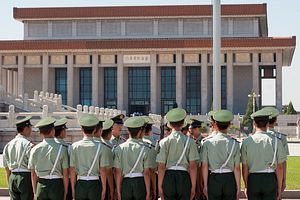When asked how free speech in modern China compares to 10 years ago, the bestselling author Han Han says the situation is volatile and that one can never predict what will touch off the censors “but, generally, with the development of society and the flow of information, it’s getting better.”
Here we have one of the nation’s most widely celebrated public intellectuals, indeed once the country’s most popular blogger, spewing drivel about free speech in China.
Because no, Han Han, the situation isn’t getting better.
In 2005, China had 32 journalists arrested. Ten years later, that figure was up 65 percent. Indeed, China is the world’s “worst jailer of the press,” according to the Committee to Protect Journalists.
“China is further clamping down on alternative viewpoints,” writes Hong Kong correspondent Cal Wong, “allowing nothing to slip through its censorship net.”
“Repression and coercion markedly increased during the year against organizations and individuals involved in civil and political rights advocacy and public interest and ethnic minority issues,” noted the U.S. State Department in its 2015 report on human rights. “The crackdown on the legal community was particularly severe.”
In fact, things have gotten so bad that Jiang Hong, a professor at Shanghai University of Finance and Economics and a government advisor, spoke out against the government’s censorship in March, saying, “If a society only listens to one voice, then mistakes can be made.”
And it wasn’t a gradual tightening of the screws, either, but a rapid hammering.
“I didn’t see it coming and I don’t think many of us did,” says Tim Cheek, a historian at the University of British Columbia in Vancouver who studies Chinese intellectualism. “I thought the party would become more latitudinarian and more flaccid [under Xi]. But this is a real muscle-up to grandpa’s way.”
Moreover, China is no longer content to keep its gags in the mouths of its own people.
“Beijing has begun to extend its claim to control people and organizations beyond its borders,” Orville Schell wrote for The New York Review of Books in April. “Despite its stubborn defense of the sanctity of sovereignty, its agents have begun reaching overseas to manipulate the foreign dialogue by setting up hundreds of Confucius Institutes, newspapers, magazines, and even TV networks that answer to the Central Propaganda Department and the CCP.”
Schell added, “What is most striking about these new tactics is their boldness and unrepentant tone. Instead of denying or apologizing for them, the CCP seems to proudly proclaim them as part of a new Chinese model of development, albeit one that has no use for liberal values from the West.”
The people themselves, and how much of this they’ll tolerate, seem to be the only saving grace, which is why Han Han’s perspective is so worrying — his popularity suggests his views may be widely held.
Han Han’s remarks come from a New York Times interview published earlier this week, which describes how the 34-year-old has put aside the “scathing social and political criticism that made his early reputation” in order to focus on other projects.
He just directed his first movie, for instance, which The Hollywood Reporter described as “devoid of meaning but filled to the brim with pretensions of artistic greatness.” He also just published a collection of essays titled “The Problem With Me: And Other Essays About Making Trouble in China Today,” in which he describes censorship in China:
We censor ourselves and each other, often shaking with fear and trepidation, trying to figure it out. It holds on to your clothes, chokes your neck, all the while telling you to run faster and sing better so the ones who wield it will look better to the world.
That sounds like a scene straight out of Nineteen Eighty-Four, and it explains why, as Han Han later admits, China has “practically no world-class authors, directors, newspapers, magazines, films.”
And yet, not only does he claim things are getting better, but when asked if he has ever practiced self-censorship, he says, “I’ve never given it much thought. All I’ve been trying to do is write interesting articles.”
You can almost see him shrugging. Censorship? That thing that leaves us “shaking with fear” and “chokes your neck?” No biggie. I just focus on my work.
Sorry if I’m unconvinced, Han Han.
He also says many Westerners wrongly believe the “Great Firewall” limits what Chinese know of the world, as if to suggest having less information doesn’t lead to being less informed.
“Of course,” he goes on, “Chinese people’s views on many issues are very different from those in the West, but that’s not the result of a lack of information.”
So when my Chinese acquaintances say the Japanese government should apologize for its wartime atrocities, that’s not because Japan’s previous apologies have been censored? And when they say China did Tibet a favor by taking over, that not because the massacres there have been censored?
“Even if every American website could be accessed here in China,” Han Han concludes, “Chinese would be just as nationalistic, or even more so.”
I certainly hope not, but one thing’s for sure — if Chinese had greater access to more information, not so many would consider Han Han a serious intellectual.

































